September: “Without Kornilov’s rebellion, there would be no Lenin” – Alexander Kerensky
September is marked by one of the final blows Kerensky’s provisional government will receive before the October Revolution that finally brings it down.
On September 1, the downtrodden Russian Army takes part in its last battle of the war, as German forces advance on Riga. Utilizing new tactics devised by General Oskar von Hutier, the German Army aims to circumvent Russian defenses, and storm the rear with heavily armed troops in order to take out the artillery. The strategy is a success, forcing Russia’s12th Army to abandon the Latvian capital’s defense, retreating along the Dvina River with the Germans in pursuit. Their army eventually captures Riga, and starts to pose a danger to Petrograd.
The Russian capital is meanwhile under a state of emergency, imposed by Kerensky, who does not know what to do with military commander-in-chief Lavr Kornilov’s exploding popularity, despite counting on the general to be his weapon in quelling leftist dissent. Kornilov, who rose through the ranks in 1917, could easily be considered the second most powerful man in Russia. And Kerensky would need to count on all the help he could get to stamp out Bolshevism for good. Most Bolsheviks, including Vladimir Lenin, were either in hiding or behind bars, but their message continued to weaponize the public against Kerensky and his government – one increasingly resembling a dictatorship both at the front and at home. The head of state enjoys support across a broad spectrum, from the generals, as well as the public and the bourgeoisie. However, even he did not count on Kornilov – a man who never espoused bolshevism – to pose a threat to his power.
Historians disagree about the events of early September, which became known as the Kornilov Affair, and revolved around Kornilov’s purported uprising against Kerensky. Desperate to crush a rumored uprising, Kerensky agrees with Kornilov to secure the capital by dispatching an army of Cossacks, disarming the garrison and dispersing the Soviet there. Before they even have a chance to reach the capital, the prime minister is overcome with fear that Kornilov will usurp all the power for himself, and suddenly labels his most trusted general a traitor, demanding his arrest, and appointing himself as Commander-in-Chief of the Russian Army.
One popular historical view is that Kerensky was simply paranoid, and acted rashly. He was aware that Kornilov had many supporters, and that it was only a matter of time until they turn on the government. But equally viable historical sources will reference the many hints that Kornilov was planning to do just that. The latter is the less popular view.
Kornilov’s Cossacks never reached Petrograd. The Soviet quickly mobilized a committee for the defense of the capital. Because only the Bolsheviks had enough sway with the public to mobilize a fighting force of workers and soldiers, many are released from prison, including Leon Trotsky. Kronstadt sailors also headed out to defend the city they had tried to take only two months ago. But in the end, no blood was spilt. A Soviet delegation had intercepted the Cossacks, persuading them to lay down their arms. Kornilov, together with 30 loyal officers, was thrown in prison near Mogilev for his alleged “counter-revolutionary conspiracy.”
Whichever view one chooses to hold, historians are in agreement that Kerensky had made a tragic misstep. For, by turning on Kornilov, he had incurred the wrath of both the Right and the Left. Army discipline, which Kornilov had pledged to restore, was plummeting faster than ever before with mass desertions. But this was not unexpected: tens of thousands of the deserters were workers and peasants who hated Kerensky with a passion, and could not wait to start building the Soviet peacetime dream of working the land. The Bolsheviks then ended up as direct beneficiaries of the anti-government wave of radicalization. By mid-September, they won their first majority at the Soviet, being the only political party that still argued for state power to be concentrated there entirely.
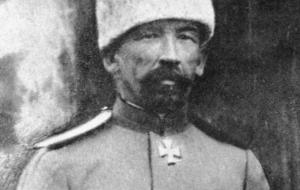
September 2, 1917
The Petrograd City Duma holds elections. SRs secure 75 seats, the Cadets – 44, Bolsheviks – 67 seats, Mensheviks-Internationalists – 8 seats, and the socialists will win 2 seats.
--
Russia’s 12th Army is fighting its last battle in the war against German forces in Riga, and losing badly. Some 9,000 men, 81 artillery guns and up to 200 machine-guns are lost.
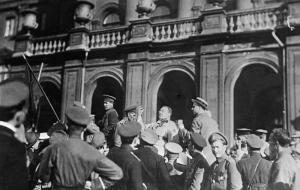
September 3, 1917
Russian forces abandon the defense of Riga, leaving it to the German army to take. German storm troops prove very efficient at storming the rear by bypassing Russian prime defenses.
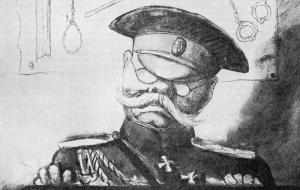
September 7, 1917
The date marks the start of the ‘Kornilov Affair’, that is to last for five days, during which Kerensky suspects the Supreme Commander of betrayal and a conspiracy to commit treason, leading to Kornilov’s eventual arrest.
Kerensky, fearing that Petrograd is about to explode in bolshevist rebellion, agrees with Kornilov to dispatch a force of Cossacks to quell the alleged uprising. But somewhere along the way, Kerensky betrays the second most popular man in the country by suddenly accusing him of treason. Some believe Kornilov concocted the idea of Bolsheviks plotting a coup d’etat in order to enter Petrograd, overthrowing the government there.
In truth, historians are not in agreement whether Kerensky’s behavior was justified, but Kornilov’s popularity did pose a threat to the Prime Minister’s cabinet, owing to political disagreements.
Kornilov’s imprisonment will only further cement Bolshevik influence over the population.
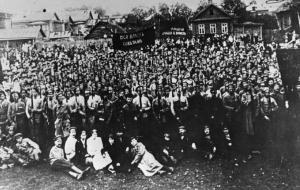
September 8, 1917
Catastrophic bread shortage in Moscow. Rations shrink to 200 gr. per day, while weekly rations in the region do not exceed 800 gr. per week. The government’s strategy of price-fixing has a detrimental effect on supply, as producers don’t want to sell at a constant loss.
Meanwhile, General Krymov and three cavalry crops, dispatched on orders from Commander-in-Chief Lavr Kornilov, are en-route to Petrograd, where rumors are surfacing of an imminent Bolshevik uprising. Their hope is to commandeer the garrison there, and disperse the Soviet. But Kerensky – who coordinated with Commander-in-Chief Lavr Kornilov a plan to quell the purported uprising – has second thoughts about Kornilov’s motives. Former State Duma MP Vladimir Lvov was earlier ferrying messages back and forth between Kerensky and Kornilov and creating misunderstanding between the sides: both thought the other wanted to establish his own one-man dictatorship. Kerensky believes that, as soon as Krymov’s men reach Petrograd, they will set up shop there, and answer only to Kornilov, who is at this time at the HQ at Mogilev.
With Krymov and the troops still days away from Petrograd, Kerensky calls an emergency meeting of the cabinet in the evening, demanding that Kornilov’s alleged betrayal is prevented and the man stripped of his rank and placed under arrest.
Lvov is already behind bars by the time of the late-night meeting.
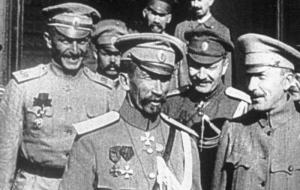
September 9, 1917
General Lavr Kornilov is officially taken off the post of Commander-in-Chief of the Army. Kerensky comes out with a national address, branding Kornilov a traitor. The Prime Minister sets about building a new cabinet – the first order of business being to replace Kornilov as Commander-in-Chief, a role he offers to General Lukomsky. But Lukomsky refuses, throwing his support behind the ousted Kornilov. A conflict between the army and government could be brewing, with Kerensky fearing that more of his generals would go Lukomsky’s way.
September 11, 1917
General Krymov’s forces, en-route to Petrograd to quell the alleged Bolshevik uprising there, is intercepted by forces gathered up by the Soviet, as well as the Kronstadt sailors (which only months ago tried to take the capital). But no blood is spilt, as Krymov and his men are persuaded to lay down their arms.
As soon as the ‘Kornilov Affair’ is dealt with, Kerensky proclaims himself new Commander-in-Chief in Kornilov’s stead.
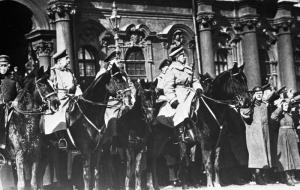
September 13, 1917
After the Kornilov Affair, Kerensky immediately proclaims himself Commander-in-Chief. He issues an order on behalf of the government, proclaiming that, “from this day forward, I am assuming command of the nation's armed forces.” He then heaps praise on the Army and Navy for bloodlessly quelling the General’s supposed revolt.
Later that day, General Krymov, who had been placed in charge of leading the cavalry into Petrograd to quell a non-existent Bolshevik rebellion, commits suicide. In the morning, he meets with the PM, swearing his allegiance to the government, and insisting that his march on Petrograd was consistent with orders he had been given. But historical sources indicate that Kerensky did not agree with Krymov’s retelling. By the evening of September 13, the General takes his own life in Kerensky’s office.
September 14, 1917
The provisional government declares Russia a Republic. The nation finds out from the press. With this decision, Prime Minister Alexander Kerensky also founds a new government Directorate, comprised of four members. The Directorate is to carry Russia forward until the creation of a new government cabinet – a task complicated by Kornilov’s alleged betrayal and a widening rift between the generals that support him, and those who support Kerensky.
September 17, 1917
Leon Trotsky is freed on bail. On that day, the Bolsheviks start forming a new Soviet cabinet.
September 22, 1917
The Bolsheviks take the Petrograd Soviet under their control. A new Executive Committee is formed, with Trotsky as Chairman. Four Bolsheviks, two Social Revolutionaries and one Menshevik are now the leaders of the Soviet. Their first order of business is drafting a resolution condemning the persecution of Lenin. Included in the resolution is the demand to free all Bolshevik and allied elements that Prime Minister Alexander Kerensky got rid of by throwing them behind bars.
Amazingly, but not entirely unexpectedly, Kerensky’s government caves in, exposing its weakness in the face of an obvious threat from the Left.
September 27, 1917
The National Democratic Convention is set up by the Executive Committee of the Soviets, together with the All-Russian Executive Committee. Its job is to bring party leaders and political organizations together for a multilateral discussion. The meeting is opposed to the Moscow State Convention (August 25-28) in its desire to create a truly “democratic” government, according to one of the Executive Committee members. The other meeting, he writes, is too full of “bourgeois” elements to effectively do that. However, other people such as Tsereteli, the Menshevik, see the Democratic Convention as an attempt to create a body the Provisional Government would answer to, becoming effectively subservient to it. And even then, leftist and rightist members of the committee hold different views: Trotsky, for one, believes that Tsereteli formulated the idea not for the purpose of holding the Kerensky cabinet accountable, but in order to contain the situation with the steady Bolshevik rise to absolute power.
-
1 September
-
2 September
-
3 September
-
7 September
-
8 September
-
9 September
-
11 September
-
13 September
-
14 September
-
17 September
-
22 September
-
27 September